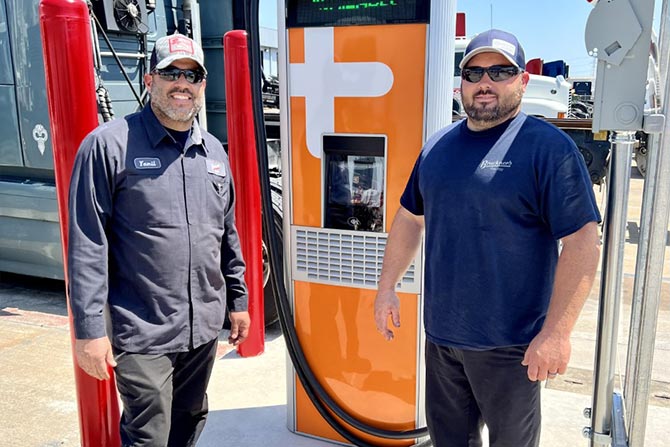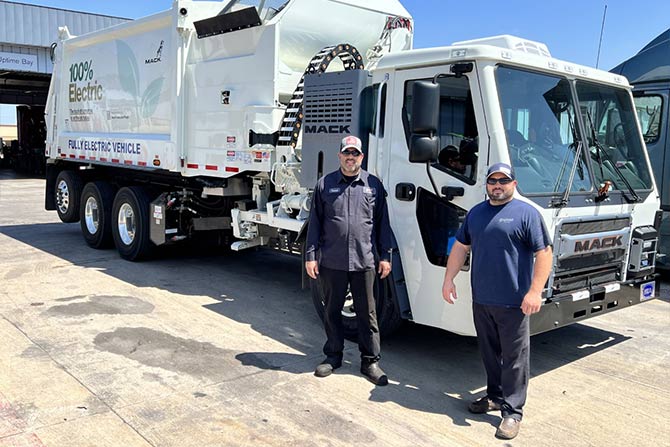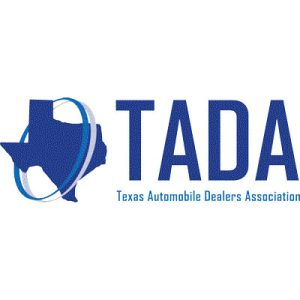Bruckner’s Truck & Equipment recently qualified for EV certification. The
certification is the first to be awarded to a Mack dealership in Texas,
so TADA visited with Brian Bruckner, president of Bruckner’s Truck &
Equipment, about the family business and that accomplishment. Brian
went to Southwestern University in Georgetown, Texas, and earned a B.A.
in general business.

Brian Bruckner

The Bruckner family legacy started when B.M. “Bennie” Bruckner, Sr., lost a job at a local Amarillo power plant in 1932 during the height of the Great Depression. He had a wife and two young children. At that time, the Texas panhandle was dealing with dustbowl conditions, and the wind blew enough dust to hide the sun for days. Times were tough for everyone. But Bennie was a mechanical wizard who could fix almost anything. He had always worked on the side fixing cars for family members when they had a car problem. As a result, it was natural for Bennie to start Bruckner’s Garage on Sanborn Street in a shop behind his house. His wife kept the books, and a 16-year-old cousin living with them became the first employee. The company soon moved into sales and began to sell industrial engines. The franchises for the truck lines he sold didn’t last past the end of World War II, but he had a big break in 1948 when he was given a Mack truck franchise. It was very successful, and Bennie became known across the country as one of the best Mack truck dealers in the U.S.
When Brian’s dad, Ben Bruckner Jr., was still in a bassinet, Bennie put the bassinet on his workbench. Ben grew up working in the business, was a shop foreman while he was in high school, and went to Texas Tech in Lubbock. Like many of the men of his generation, Ben served four years in the army, was honorably discharged, and returned to work in the family business in the early 1950s. He served at Fort Huachuca in Arizona as a signal corps member and brought back the knowledge he learned about supplies and inventories to modernize the business. Ben never retired; he died in 2011 when he was 82.
Bruckner’s Truck & Equipment became a third-generation family business when Bennie started giving Brian summer jobs to do when he was 12. By the time he graduated from college in 1990, he had worked everywhere except the lot
and sales. Brian worked in sales and leasing for 10 years, then was promoted to general manager of the Amarillo, Texas, dealership. He has been full-time for 32 years and began his current role as president in 2007. His younger brother, Chris, has been with the company since 1994 and is the executive vice president and partner. They have divided their responsibilities and duties according to their specific strengths.
Bruckner’s Truck & Equipment in Fort Worth, Texas, is the first EV certified Mack dealership in the state. “We recognized that electric vehicles were going to be important in the future and the industry,” said Brian. “We wanted to support EVs as they come into the marketplace. We didn’t sell the EVs at Fort Worth. A dealer sold them in another state as part of another fleet package, but we will be supporting them. These EVs will deliver beer cans to the Miller brewery in Texas; there are several prospects to sell vehicles in that market.”
The cost of meeting the EV certification requirements varies. One major cost was the charger itself. There can also be a cost for the electrical service coming into the building. The EV certification required 480 V three-phase electricity, but the Fort Worth location already had that for its trucks, which brought the cost down. The charger, installation, training and tools to satisfy the requirements cost about $200,000.
For Bruckner’s Truck & Equipment, certification took almost nine months after the company’s leadership started the process and ended in May 2022. Employees had to be trained, and Bruckner’s had to bring in tooling. The setup for the charger took the longest time. Chargers were in short supply, and Bruckners had to modify the site’s electrical service and run the line out to the place in the parking lot where the charger was to be located. Bruckner’s chose to place the charger in the yard because that location made the most sense in terms of accessibility for heavy-duty trucks. Access within the service department would have been more limited because the charger could have been blocked if another truck was being worked on. The current charger location works well, but employees are still learning about EVs and charging.
Charging time depends on the battery configuration of the truck being charged and is measured in kilowatt-hours. Speeds range between 50 kilowatt-hours and 250 kilowatt-hours. “We installed a 150-kilowatt charger because trucks in the shop for service don’t need rapid charging,” said Brian.
Trucks have battery configurations of four batteries or six batteries. Charging time also varies a lot depending on how depleted the battery is. Generally, a complete charge takes about three to four hours.
Bruckner’s Trucking and Equipment has two EV-certified techs, Yamil Salgado and Bryan Renfro. They were chosen for certification because they were some of the most senior and experienced technicians. “The training was a technical challenge and involved an extensive process,” said Brian. “We wanted very experienced technicians for it. They took online courses and then had a one-week in-person training period. However, because of the high voltages involved, we had everyone trained about safety. We call the work area a pen, and when the technicians pull a truck into the pen, no one else is allowed in while they are working on the EV.”
Mileage between charges varies on a Mack LR Electric and is dependent on the load and driving conditions. “We expect the LR to be used in refuse service,” Brian said. “It is usually driven 100-120 miles on a residential route and has about 700 stops along the route. If you compare that to a Mack or a Volvo electric on a highway, those trucks can travel 275 miles between charges. A highway type service is a very different application than a refuse service.”
From a project management standpoint, EVs in commercial service have many variable factors that affect performance. “We work to determine the exact use of the vehicle to determine how far they can go and to make sure the route fits the vehicle,” said Brian. “It’s a holistic process to determine how the commercial vehicle will fit the intended use. That takes a lot of time and consideration, and it is a different process for commercial service than other vehicles. We consider the number of stops, whether drivers are driving over hilly terrain, the vehicle’s weight, whether a vehicle is empty or fully
loaded, and the environmental factors such as extreme heat or cold. Even climate control in the cab as drivers run heat or AC can affect the range.”
Brian is glad the dealership is certified now. “We are excited about the future of our industry and zero-emission vehicles. Certification is an important step for us, and it will be great for the environment, the industry and the economy as the industry moves to EVs.”
For more information on Bruckner’s being EV certified, click here to see the press release: https://dealers-choice.thenewslinkgroup.org/bruckners-the-first-mack-ev-certified-dealer-in-texas/.







